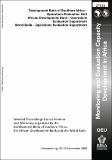
Publications & Research :: Publication
Monitoring and Evaluation Capacity Development in Africa : Selected Proceedings, Johannesburg, 25-29 September 2000
Attachments [ 2 ]
More Details
The importance of the monitoring and evaluation (M&E) function within public administration has been magnified by the growing voice of civil society, which has brought the issues of good governance and more effective public administration to the fore. The global trend towards more accountable, responsive and efficient government has bolstered the appeal for M&E capacity development, which has been the central focus of efforts to improve governance in the context of a comprehensive development framework. Evaluation has become increasingly important in Africa owing to stagnant, and negative economic growth rates, together with concerns related to governance, and doubts about the efficacy of development assistance. These are selected proceedings from the seminar and workshop on "Monitoring and Evaluation Capacity Development for Africa" as a follow-up to the regional seminar, to foster networking among M&E practitioners, and to share knowledge on M&E in the context of improved governance, accountability, and effective development delivery, and results. In addressing monitoring and evaluation, and the development challenge in Africa, selected topics in Part I, vary from the policy challenge as viewed from the African Development Bank perspective, through new dimensions of poverty-focused evaluation within a comprehensive development framework, to key challenges for M&E practice in Africa. Part II offers an overview of evaluation capacity development in selected African states, and its role in rebuilding demand and infrastructure for M&E. In addressing evaluation capacity development through new methodologies, Part III examines how to focus the M&E of development programs on changes in partners, and the implications of decentralized delivery for national M&E, while Part IV reviews African sector experiences, through case studies and implications for M&E. Finally, Parts V, VI and VII address how to develop national evaluation associations, and opportunities for international cooperation; looking at the future through National Action Plans for 2001; and, the way forward.
Comments
(Leave your comments here about this item.)